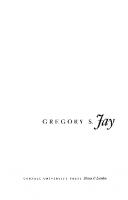Between ‘Race’ and Culture: Representations of ‘the Jew’ in English and American Literature 9780804780001
This collection of essays examines various representations of “the Jew” in British and American literature in the ninete
143 35 49MB
English Pages 240 Year 2022
Recommend Papers

- Author / Uploaded
- Bryan Cheyette
File loading please wait...
Citation preview
Between ''Race)) and Culture
Stanford Studies in jewish History and Culture Edited by Aron Rodrigue and Steven J. Zipperstein
Contributors Murray Baumgarten Bryan Cheyette Maud EHmann Jonathan Freedman William Galperin Sander L. Gilman Eric Hornberger Phyllis Lassner Andrea Freud Loewenstein Marilyn Reizbaum Jacqueline Rose
Between ''Race'' and Culture Representations of ccthe Jew)) in English and American Literature Edited by
Bryan Cheyette
Stanford University Press Stanford, California 1996
Stanford University Press Stanford, California © 1996 by the Board of Trustees of the Leland Stanford Junior University Printed in the United States of America CIP data are at the end of the book Stanford University Press publications are distributed exclusively by Stanford University Press within the United States, Canada, Mexico, and Central America; they are distributed exclusively by Cambridge University Press throughout the rest of the world
In memory ofJack Cheyette {I93I- I994)
Preface
The idea for this volume was first conceived at a Modern Languages Association conference when I was struck by the many and varied approaches to the representation of"the Jew'' in English and American literature. Mter a decade of working single-handedly in this area, my isolation had, at last, come to an end. Following the response to my Constructions of((the jew'' in English Literature and Society, I came to realize that there was, after all, a community oflike-minded scholars treating this subject matter with theseriousness it deserves. This sense of community, however, has been under attack in the 1990s as the study of literary racism and antisemitism has been mistakenly demarcated into broadly defined "politically correct" and "liberal humanist" positions. What is ironic about these supposedly antagonistic divisions is that they are, in fact, mirror images of each other. On the one hand, "liberal humanism" believes that the ameliorating western canon has, by definition, nothing to do with racism or antisemitism. On the other hand, "political correctness" wishes to exclude from the academy any literary text deemed to reinforce oppressive stereotypes. Both sides, in other words, moralize racism as a peculiar evil that is beyond rational discussion. In this way, they simply reproduce the complacent self-image of a civilizing AngloAmerican liberal culture that considers racists or antisemites to be pathological fanatics banished to the margins of society. The phony war between "liberal humanism" and "political correctness" has, inevitably, generated a good deal of heat and not much light. What is more, in practice, the polarization of this debate has stifled any genuinely
vm
Preface open dialogue about the complex nature of racism and antisemitism within literary texts. For this reason, the diverse essays in this volume aim neither to excuse nor accuse the many writers that are examined. It seems hopelessly counterproductive to compose a latter-day "index of forbidden works" of authors who are peculiarly evil and who should, therefore, no longer be read. Such censoriousness simply continues the cycle of hatred that all thinking people, at least, should want to end. At the same time, the authors in this volume treat, with rigor, the many different forms that Anglo-American literary racism and antisemitism took in the nineteenth and twentieth centuries. In this way, it is hoped that valuable connections can be made within and between writers and other social and political contexts. The collection does not impose a schema or new orthodoxy, but instead encourages a plurality of approaches to a difficult and always contentious subject. Above all, it challenges the misguided notion that this area is really a matter of common sense and personal experience and does not need the discipline of hard thinking. The initial interest of Steven Zipperstein in this project resulted in an early commitment from Stanford University Press that enabled me to approach the contributors to this volume with confidence. During his time at Oxford University in the early 1980s, Steven Zipperstein bolstered my research interests when others, in English literature departments, were dismissing them as overly "narrow." The anonymous readers of the typescript were equally encouraging and insightful. Norris Pope, Amy K.latzkin, and Ellen Stein, at Stanford University Press, have been exemplary editors who have made the publication of this book as smooth and as stress-free as possible. Although this enterprise spans the Atlantic Ocean, I have often felt that it has been handled with remarkable intimacy. Since moving to Queen Mary and Westfield College in 1992, I have been fortunate enough to work closely with Jacqueline Rose, who has been a constant source of intellectual stimulation and who has, in particular, prevented me from many infelicities in this collection. Lisa Jardine and Jacqueline Rose, at QMW, both accepted me because of my research and not in spite of it. My thinking has therefore been invigorated by students and colleagues at QMW who have not been afraid to slaughter any number of sacred cows and who have stimulated me to rethink many of my most favored beliefs. Zygmunt Bauman, Janina Bauman, David Cesarani, Todd Endelman, David Feldman, Gabriel Josipovici, Tony Kushner, Laura Marcus, Benita Parry, Gillian Rose, and Nadia Valman have all made this book better than it might have been. I offer, in particular, my heartfelt thanks to the contributors to the volume, who have been a pleasure to work with. Now that there is no longer any need to chase deadlines, I will happily stay in friendly correspondence with all of them. My wife, Susan Cooklin, has
Preface once again created a loving and supportive atmosphere in which to write and, along with my mother and sister, has continued to keep my feet firmly on the ground. This book is dedicated to my father, who, sadly, died during its production. His response to its publication would, as ever, have been honest and full of warmth. I will dearly miss our conversations about where we should go from here.
ix
Contents
Contributors
xiii
Introduction: Unanswered Questions Bryan Cheyette 2
Romanticism and/or Antisemitism
16
William Galperin
3
Mark Twain and the Diseases of the Jews
27
Sander L. Gilman 4
Seeing Double: Jews in the Fiction ofF. Scott Fitzgerald, Charles Dickens, Anthony Trollope, and George Eliot
44
Murray Baumgarten
5
Henry James and the Discourses of Antisemitism
62
Jonathan Freedman 6
The Imaginary Jew: T. S. Eliot and Ezra Pound Maud Ellmann
84
xu
Contents 7
A Nightmare of History: Ireland's Jews and Joyce's Ulysses
I02
Marilyn Reizbaum 8
Dorothy Richardson and the Jew
II4
jacqueline Rose 9
IO
"The Milk of Our Mother's Kindness Has Ceased to Flow": Virginia Woolf, Stevie Smith, and the Representation of the Jew Phyllis Lassner The Protection of Masculinity: Jews as Projective Pawns in the Texts of William Gerhardi and George Orwell
129
145
Andrea Freud Loewenstein II
Some Uses for Jewish Ambivalence: Abraham Cahan and Michael Gold
165
Eric Romberger Notes Index
183 219
Contributors
Murray Baumgarten teaches English and comparative literature at the University of California, Santa Cruz, and is the founding director of the Dickens Project at Kresge College. His many publications include City Scriptures: Modern Jewish Writing and, as coauthor, Understanding Philip Roth. He recently coedited Homes and Homelessness in Victorian Literature, and he is the editor ofJudaism: A Quarterly Journal. Bryan Cheyette teaches English literature and Jewish cultural studies at Queen Mary and Westfield College, University of London. He is the author of Constructions of









